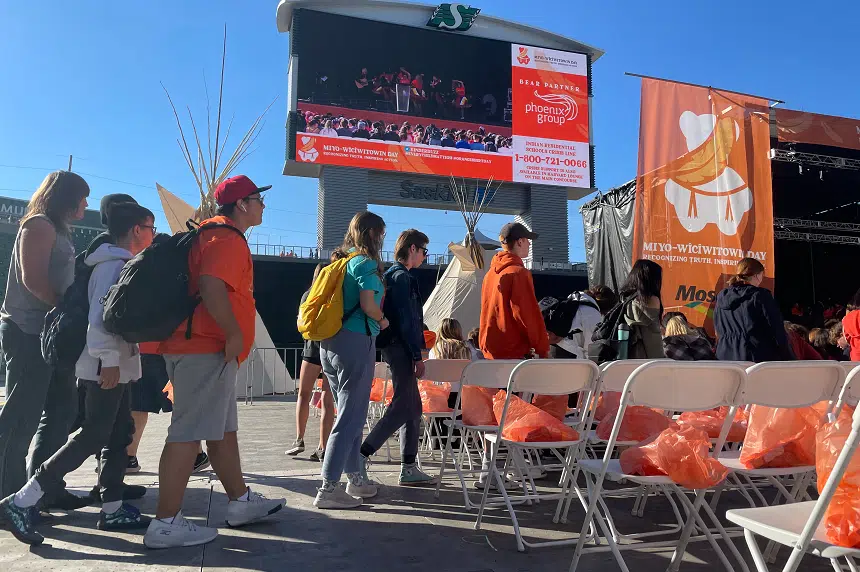Ted Quewezance said granting forgiveness to those who harmed him was the most difficult thing he has ever done.
Quewezance spoke to the crowd at Miyo-wîcîwitowin Day at Mosaic Stadium Thursday. When Quewezance was just five years old, he said an Indian Affairs car that was escorted by the police came and picked him up from his home and took him to Gordon’s Indian Residential School.
Quewezance said he was physically, sexually, and emotionally abused while he attended the residential school.
“When you cried to go home, you cried alone,” said Quewezance. “Many times you were slapped to keep quiet.
“I was sexually abused over and over, for years … and there was no one to protect me.”
Quewezance said he stayed in the residential school for 12 years. Three generations of the Quewezance family went to residential schools, he said, spending over 100 years in the schools in total.
While there are many residential school survivors, Quewezance said every Indigenous person is affected by residential schools, which caused generations of trauma.
Quewezance said he understands how difficult it can be to forgive.
“It is one of the most hard things in your life that you could have to do, is to forgive,” said Quewezance.
“But I share with you, it is one of the most powerful things, is to forgive one another as you move forward in life.”
Therapists on hand during stadium event
Many people were walking around Mosaic Stadium at Miyo-wîcîwitowin Day with orange “Every Child Matters” shirts, but a few stood out from the crowd, wearing purple. Those were therapists on hand to help anyone who needed it.
Claudia Goodwill spent the day dressed in a purple shirt. She was a member of the therapeutic support team for residential school survivors and Indigenous elders, but also for people who were impacted trauma that carried through generations.
Goodwill said it was important to attend, because she understands how triggering conversations around residential schools can be. She knows because she attended a residential school herself.
“I know how going to a residential school impacted me, and how those effects impacted my kids, and my grandkids,” said Goodwill.
She said she spent much of the day helping people find healthy ways to cope with traumatic memories.
Goodwill said she still feels the effects of inter-generational trauma herself, and see her family affected as well. When she first had children, she said she struggled.
“I didn’t know how to love,” said Goodwill. “I didn’t know how to show affection, because it was never taught to me.”
Goodwill said it was difficult for her to show her children affection, but she worked to get better at it.
“I learned later on it’s easy to say ‘I love you,’ but it’s another thing to be able to show and express it,” said Goodwill. “Especially when there are the effects of residential schools.”
Goodwill encouraged anyone who is suffering to speak to a therapist about experiences that impacted them.
Shade Noyes, a youth addictions counsellor who works in schools across Regina, also put on his purple shirt for Miyo-wîcîwitowin Day.
“Obviously when we talk about Orange Shirt Day and everything that has gone on, sad emotions, heavy emotions, feelings of shame, guilt, whatever it is, we are just here to help support people in whatever way that we can,” Noyes said.
Noyes said it was important to volunteer for the event, because he sees how colonialism affected some of the students he worked with.
The counsellor explained that having trauma-informed therapists at events that discuss traumatic situations will help ensure that everyone makes it home safe.











